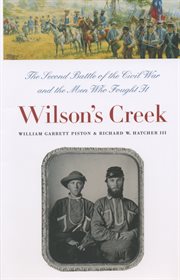Nonfiction
eBook
Details
PUBLISHED
Made available through hoopla
DESCRIPTION
1 online resource
ISBN/ISSN
LANGUAGE
NOTES
In the summer of 1861, Americans were preoccupied by the question of which states would join the secession movement and which would remain loyal to the Union. This question was most fractious in the border states of Maryland, Kentucky, and Missouri. In Missouri, it was largely settled at Wilson's Creek on August 10, 1861, in a contest that is rightly considered the second major battle of the Civil War. In providing the first in-depth narrative and analysis of this important but largely overlooked battle, William Piston and Richard Hatcher combine a traditional military study of the fighting at Wilson's Creek with an innovative social analysis of the soldiers who participated and the communities that supported them. In particular, they highlight the importance of the soldiers' sense of corporate honor--the desire to uphold the reputation of their hometowns--as a powerful motivator for enlistment, a source of sustenance during the campaign, and a lens through which soldiers evaluated their performance in battle. In the summer of 1861, Americans were preoccupied by the question of which states would join the secession movement and which would remain loyal to the Union. This question was most fractious in the border states of Maryland, Kentucky, and Missouri. In Missouri, it was largely settled at Wilson's Creek on August 10, 1861, in a contest that is rightly considered the second major battle of the Civil War. In an in-depth narrative and analysis of this important but largely overlooked battle, William Piston and Richard Hatcher combine a traditional military study of the fighting with an innovative social analysis of the soldiers who participated and the communities that supported them
Mode of access: World Wide Web







